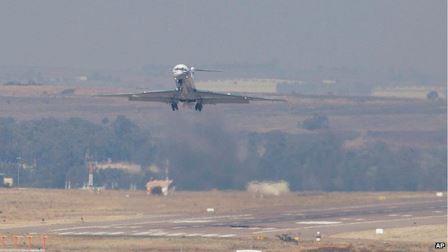Africa VS the ICC — Are there more war criminals in Africa?


[/media-credit] An aircraft said to be carrying Mr Bashir takes off from an air base near Pretoria on Monday
Leaving South Africa on his private jet after attending the African Union Summit last week, the President of Sudan, accused of war crimes over his conduct in the Darfur region, somehow felt safe enough to attend an event hosted by a signatory to the Rome Statute, the treaty that created the ICC in 2002.
So what is the deal? Are Africans willfully ignoring the ICC, or is the ICC just that incompetent? Probably a little of both. Al-Bashir is the only current head of state with an ICC arrest warrant. He is charged with seven counts of war crimes and crimes against humanity as well as three counts of genocide-related to ethnic cleansing. He is thought to be responsible for over 300,000 deaths in the western part of Sudan. The ICC also has evidence that he siphoned off $9 billion in Sudanese public funds to personal banks in the UK.
The other six outstanding cases are against warlords like Uganda’s Joseph Kony of child soldier infamy, or former leaders such as Laurent Gbagdo from Ivory Coast, who is set to go to trial later this year. Since 2005, when 11 countries referred the Darfur case to the ICC, including Benin and Tanzania, Bashir has visited Chad (2011), Kenya (2011), Malawi (2011), Nigeria (2013) and now South Africa (2015).
All countries are signatories to the Rome Statute. How is he getting away time and time again? It may have something to do with the reputation of the ICC at the highest levels of African politics. The AU has publicly denounced the ICC, and many heads of states echo that sentiment.
Robert Mugabe, now the chair of the AU, has said he does not want the ICC in the region at all. It is alleged that South African President Jacob Zuma promised Al-Bashir he would not be arrested. Ethiopian Prime Minister Hailemariam Desalegn told the AU in 2013 that the ICC had degenerated into “race hunting.”
Ugandan President Yoweri Museveni called the ICC a “tool to target” Africa. Rwandan President Paul Kagame has accused the ICC of “selective” justice. These are pretty harsh criticisms, given that African states themselves have played a key role in facilitating ICC cases.
Four of the eight countries with open investigations in Africa invited the ICC in themselves. Nigeria and South Africa were among the states that voted unanimously for the Libya case referral in 2011. In Ivory Coast and Kenya, the ICC itself opened the investigations; however, Ivorian President Alassane Ouattara welcomed the 2011 arrest of former leader Laurent Gbabdo, and the ICC stepped in against Uhuru Kenyatta in the Kenya case only after domestic investigations stalled. Since then, Kenyatta’s case has been dropped.
But, the ICC has been accused of selectively investigating African countries. And in truth, only Africans are on trial at the moment, and the six trial-ready cases at the top of 2015 involve Africans. The only two convictions so far, since the founding of the ICC in 2002, have involved Congolese warlords.
But the better question is perhaps, why have there only been two convictions in 13 years?
Given the criticisms, the current ICC Chief Prosecutor Fatou Bensouda, a Gambian lawyer, is proving fewer Africa-focused in her investigations than her predecessor, Argentinian Luis Moreno Ocampo.
Currently, according to public court data, The Office of the Prosecutor is conducting probes into crimes against humanity and war crimes in at least 16 countries, including the United Kingdom’s activities in Iraq, attacks against civilians in Colombia, and others in Afghanistan, Georgia, Honduras, Palestine, and Ukraine.
Clearly, crimes against humanity are not an African-only problem, though African leaders should not use the ICC focus as an excuse to shelter war criminals. As the ICC broadens its investigative reach, the indignant ground on which to excuse war crimes falls away. Darfur was and still is genocide.
Al-Bashir isn’t being targeted for being African, he is being targeted for being a war criminal. The ICC may not have many teeth on the ground, but the Continent should not stand by and watch as leaders pile up the bodies for their own people, whether there is a court to prosecute them or not.
